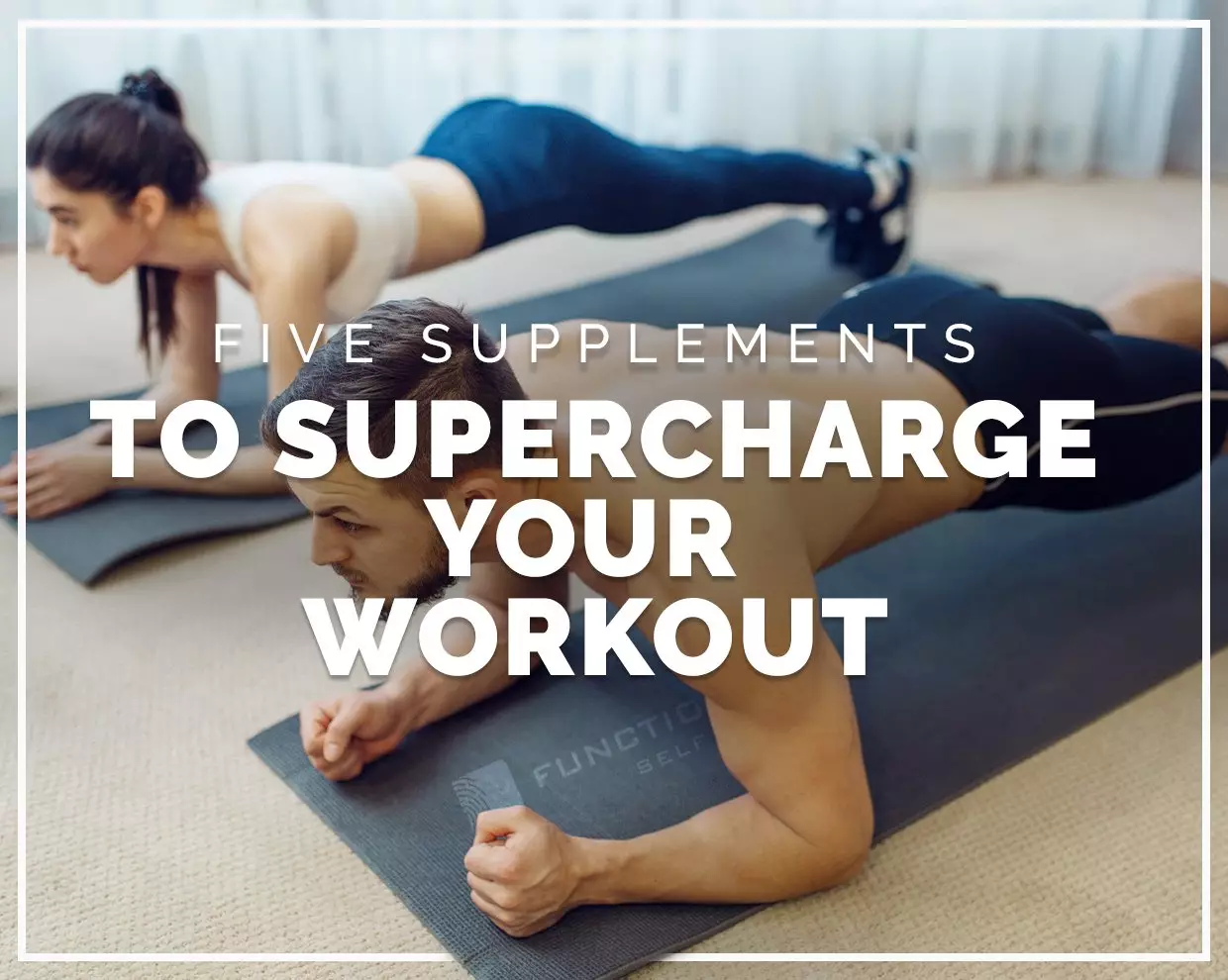By Functional Self founder, Brad Johnston
There’s nothing quite like starting your training session knowing that you have everything optimised for a successful workout. You’re well-hydrated, you’ve slept well, and had the right macronutrient balance you need for peak energy.
Sounds pretty great, right?
In reality, training isn’t like this 100% of the time or even 70% for that matter. Life happens, and we can all get a little off track with our plans to “earn that workout”. This might include things like excess stress, working long hours, or sleep debt. However, there are also hidden barriers such as sub-optimal nutrient levels which can occur despite our best efforts. This is where things like lab testing and supplementation can be invaluable to peak health and physical performance.
Science-backed workout supplements can supercharge your energy levels and help remove these obstacles or at least bring the odds back in your favour to achieving your fitness goals. They work alongside a good diet, by supporting muscle recovery and allowing you to get the most from your workout.
For anyone who wants to start exercising again after a break, supplementing well provides a great starting off point. This doesn’t just mean the supplements that you take immediately before training, but also includes what you take the night before, the morning before, and post-workout to ensure you get the most out of your exercise.
Science-backed supplements that optimise your training (… and when to take them!)
-
1. Magnesium for cellular energy
-
Magnesium is an essential mineral that we need to maintain optimum health and is needed for muscle function and energy production – all very essential for a great workout.
Our main source of cellular energy is ATP (adenosine triphosphate). ATP must bind to a magnesium ion in order to be biologically active, showing how crucial magnesium is to cellular function(1). Magnesium plays an important role in the health of our mitochondria(2), which provide intracellular magnesium stores as well as being the powerhouses of our cells (see more on mitochondrial health below).
Although magnesium is one of the most abundant minerals on earth, monocropping and soil depletion have reduced our ability to get adequate magnesium from our food. This is one of the reasons that many functional health practitioners recommend magnesium as a supplement that almost everyone should take.
WHEN TO TAKE MAGNESIUM: For morning supplementation I take Smidge® Morning Magnesium which combines magnesium malate with magnesium taurinate and magnesium orotate along with boron, an important cofactor. In the evening, Smidge® Evening Magnesium is a good source of magnesium glycinate and magnesium oxide to provide restful sleep, so you’re ready for tomorrow’s workout!
-
2. Coffee to boost metabolism
Whether you are starting a cardio workout, at-home bodyweight session or high-intensity HIIT training, coffee can help to improve energy levels and give you the extra boost to power through.
This is partly because coffee and caffeine have thermogenic properties which boost your metabolism, as well increasing fat oxidation(3).
Coffee also suppresses mTOR - mammalian Target Of Rapamycin. Animal studies have shown that both regular and decaffeinated coffee can suppress mTOR, a mechanism in your body that helps you build muscle, resulting in better muscle gains from your workout(4).
BEST TIME OF DAY FOR COFFEE: First thing in the morning is usually best, and then about 30 – 60 minutes before your workout. If you work out in the afternoon or evening try decaf high-fat coffee instead.
-
3. Zinc for energy production and physical performance
Zinc plays a key role in the way that our bodies metabolise the macronutrients in our diet - including fats, carbs and proteins(5). As well as supporting energy production for your workout and overall physical performance, zinc is also the gatekeeper of immune function (we wrote more about this on an earlier blog) and is great for boosting your testosterone to help increase your muscle and bone strength(6)(7).
BEST TIME OF DAY FOR ZINC: Zinc is something you need once per day, it doesn’t need to be right before your workout. I usually take mine in the morning or an hour before bed, just make sure there is an hour or so before you take the magnesium as they can compete for the same transporter.
-
4. Collagen to support joints and aid recovery
Collagen contains a broad range of amino acids that support healthy bones, protect your joints and aid the repair of connective tissue throughout your body. This makes it very important to your workout and recovery.
We make collagen from the proteins in our food, but as we age, our ability to produce collagen is depleted. This means workout recovery or tissue injury repair can be slower when you don’t produce enough collagen.
I take Great Lakes Wellness - Collagen Hydrolysate which provides 20 different amino acids to aid the healing and repair of connective tissue. It is made from the hide of grass-fed, pasture-raised cattle, and is glyphosate free and keto-friendly.
WHEN TO TAKE COLLAGEN: For best results, take a tablespoon of collagen twice a day, in the morning and post-workout to optimise your recovery. I like taking this in either my morning coffee or mixing into a good Paleo bircher/muesli, I will then take it again after I work out in some water, to help blunt the potential cortisol spike.
-
5. Unfair Advantage for mitochondrial support
Bulletproof - Unfair Advantage contains PQQ and CoQ10 to repair and support mitochondrial efficiency, and I notice this has a big impact on my workout and concentration levels.
Mitochondria are the ‘powerhouses’ that provide ATP energy at a cellular level, and with strong mitochondrial support you can expect a boost in athletic energy, mental function and overall sports performance.
You may be wondering what else you can do to support the health of your mitochondria. Most of the research on mitochondrial biogenesis (the creation of new mitochondria) shows that all areas of health optimisation play a part, including good sleep(8), low-inflammatory foods, and regular exercise(9).
For me, Unfair Advantage is the best supplement to boost mitochondria ahead of a workout because the combination of PQQ and CoQ10 in a colloidal delivery system enhances bioavailability and absorption.
WHEN TO TAKE: I take Unfair Advantage a few times a month when I need an extra edge. It’s great for athletic competitions or days when you need to feel your best. I like to take this an hour before my workout for the best results.
Summing it all up
Exercise is one part of your health where the science is clear - every human needs physical activity in their lives. A recent review of the research found that “physical inactivity is a primary and actual cause of most chronic diseases”(10) .
I hope that these supplements help you to supercharge your workout, whether you are a fitness pro or just getting started on your health journey. As always, please get in touch if you would like our team of health coaches to help you with your training, supplementation or other areas of health.
References
1 The Involvement of Mg2+ in Regulation of Cellular and Mitochondrial Functions
2 Crucial Role for DNA Ligase III in Mitochondria but Not in Xrcc1-dependent Repair
3 Caffeine and Coffee: Their Influence on Metabolic Rate and Substrate Utilization in Normal Weight and Obese Individuals
4 Coffee Consumption in Aged Mice Increases Energy Production and Decreases Hepatic mTORLevels
5 Zinc status is associated with inflammation, oxidative stress, lipid, and glucose metabolism
6 Effect of Fatiguing Bicycle Exercise on Thyroid Hormone and Testosterone Levels in SedentaryMales Supplemented With Oral Zinc
7 Effects of a Novel Zinc-Magnesium Formulation on Hormones and Strength
8 Sleep Disorders Associated With Primary Mitochondrial Diseases
9 Effects of Exercise on Mitochondrial Content and Function in Aging Human Skeletal Muscle
10 Lack of exercise is a major cause of chronic diseases

 AU Store
AU Store  UK Store
UK Store NZ Store
NZ Store EU Store
EU Store









